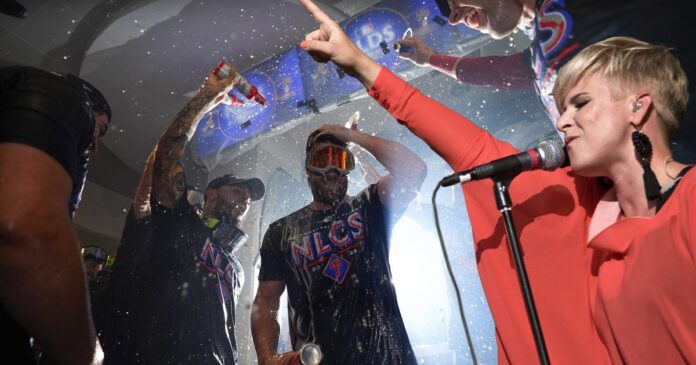
Before the Phillies used it to celebrate an unexpected playoff run and before the Boston Red Sox dubbed it the soundtrack of the 2021 season, “Dancing on My Own” was an anthem for pining girls and gays to cry and dance to.
You wouldn’t know it right now in Philadelphia, though.
Everyone from the Inquirer to Billboard Magazine have been writing about the Phils’ unexpected embrace of a Tiësto remix of a Calum Scott cover. The song hit the Phillies’ bullpen and locker room by way of catcher Garrett Stubs, the team’s unofficial DJ, who snuck it into a playlist full of Dua Lipa and other pop hits.
“Dancing on My Own” is even being blasted twice daily in Rittenhouse Square Park — initially without mention of the song’s original singer or its place in the zeitgeist of the chronically online and chronically in love.
When Billy Penn posted a screenshot of an email that attributed the song to someone other than Robyn — the song’s original artist — our mentions were flooded with people begging for someone to get the attribution right.
“Amazing. But justice for Robyn,” tweeted Inquirer political reporter Julia Terruso.
“Me, 2 blocks away, closing my window if it’s not Robyn’s version,” said another Twitter user alongside a gif of Wendy Williams. One called the whole thing “Robyn erasure.”
“Dancing on my Own” was the lead single from the Swedish singer’s 2010 album “Body Talk,” and it tells a pretty straightforward story: Inspired by a particularly bad breakup of Robyn’s, the song viscerally describes what it’s like to watch your ex-boyfriend dance with someone else at a nightclub.
For some that might sound like stuff of a stress nightmare, but the song’s pulsating synths, honest voyeurism, and surprise silver lining has resonated with a generation of young people who have grown up in the age of social media, watching others — ex-situationships included — appear to have more fun than them.
Though the original “Dancing on My Own” never cracked the Billboard Hot 100, it developed a cult following over the last decade that has repeatedly cast it on the cusp of the mainstream. British publication The Guardian named it the best song of 2010 and pop megastar Lorde used the single as inspiration for her second album “Melodrama.”
The song has also soundtracked endless pop culture moments about that weird triangle of longing, coming of age, and finding community: Lena Dunham and Allison Wiliams danced to it on “Girls” after a character finds out her lover is gay, Elle Fanning sings it to escape her small town in the drama “Teen Spirit,” and a video of a crowded New York City subway platform harmonizing to it went viral in 2019.
Robyn’s “Dancing on My Own” also sits within the queer musical canon. It plays regularly in a lot of Philly’s gay clubs, but some have also connected the song’s theme of acute loneliness to the experience of coming out.
“Gay culture has always had to embody outsidership,” Robyn told OUT magazine in 2011. “I think it’s a song about being on the outside — very physically — and if it feels like a gay anthem then I take that as a super compliment.”
Music history aside, how does this all connect to the Fightin’ Phils?
It starts with Boston.
Four years after British singer Calum Scott and Dutch DJ Tiësto covered the tune, then-backup Red Sox catcher Kevin Plawecki used it as his walk-up song before assuming team DJ duties and sneaking it into a playlist after the Sox beat the Tampa Rays in the 2021 American League championship. Robyn said she found the song’s first stint as a sports anthem “bonkers,” but it’s not clear if either team understands its underlying point.
Plawecki last year told the New York Times the lyrics “don’t make sense at all,” but he liked the song because he’s a “vibe guy.” As for the Phils, Billy Penn has yet to see any of the team’s players acknowledge the original.
The Sox’s sudden stanning of “Dancing on My Own” received mixed reactions back in Boston: Some hailed the team as LGBTQ+ allies for even liking some version of the song, while others chastised the team for using the “inferior version” of the cult classic.
“Her music is still oddly suited well for the vibes of a locker room party,” wrote sports writer Bryan Kalbrosky for USA Today. “Let’s hope whoever is on the [Sox’s] aux decides to play the original rather than the cover.”
Philadephians can only hope someone in the Phillies’ locker room does the same.







